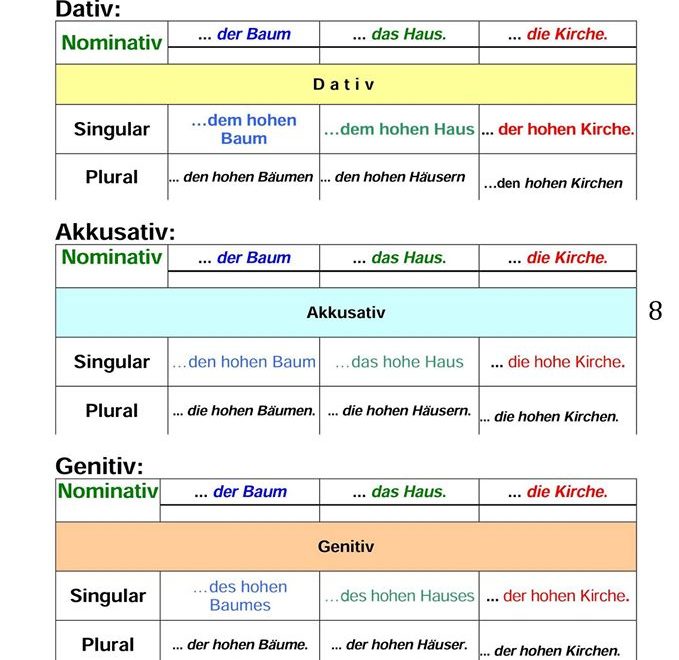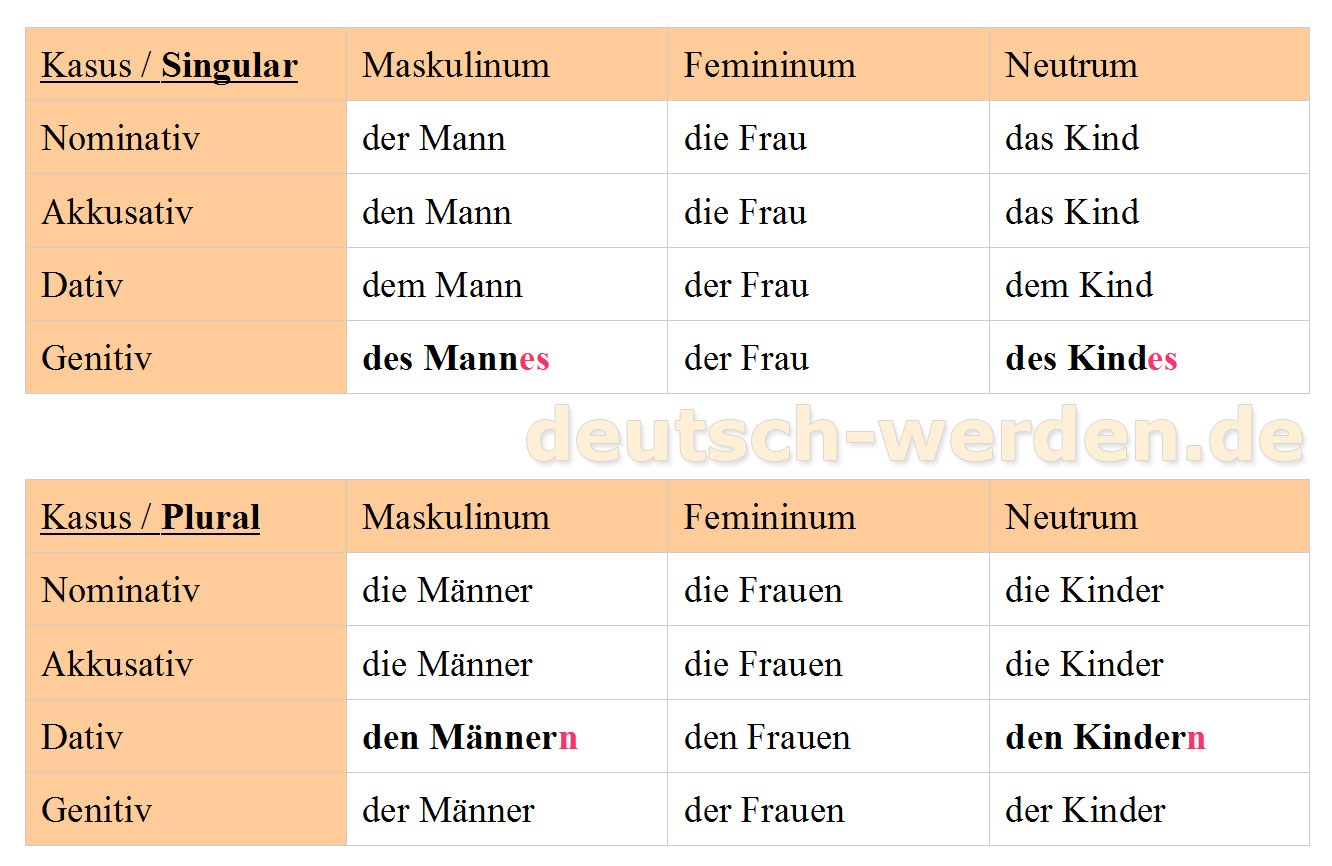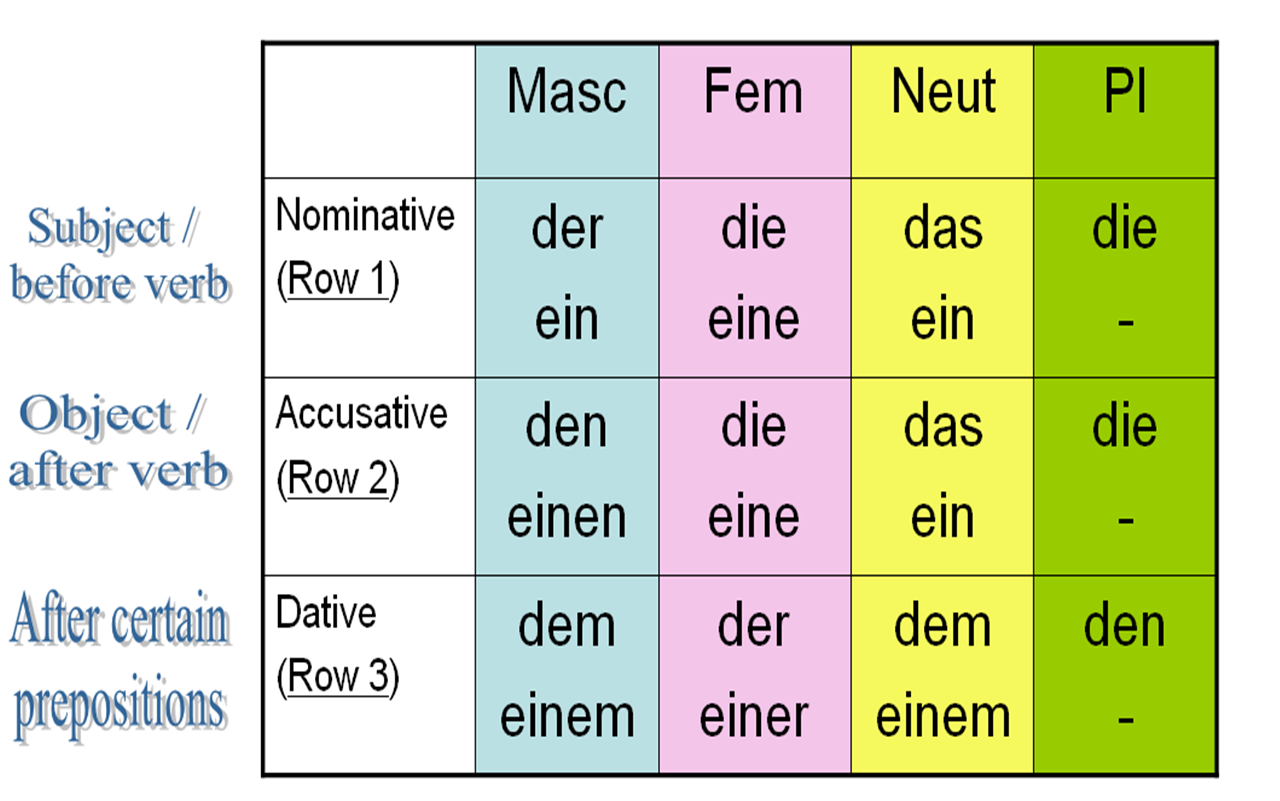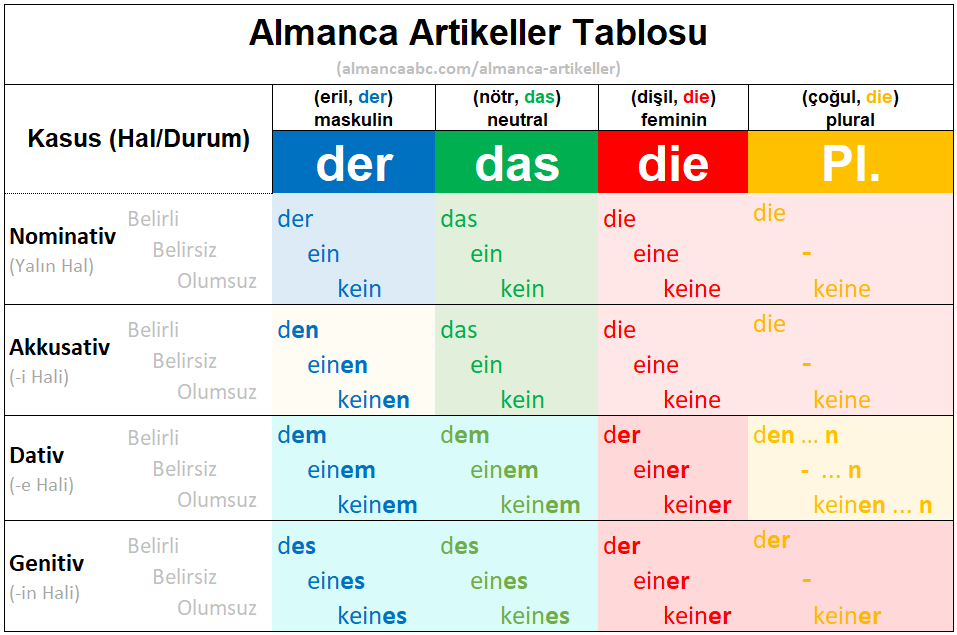
Dativ, Akkusativ und Genitiv Deutsch Viel Spass
Einleitung. Genitiv, Dativ und Akkusativ zu erkennen, ist für Deutschlernende oft nicht so einfach. Bestimmte Verben und Präpositionen im Deutschen verlangen einen bestimmten Fall. Vor allem die Anwendung von Dativ und Akkusativ ist oft ziemlich kompliziert. Mit der folgenden Übersicht lernst du ganz schnell, diese Fälle zu unterscheiden.

Die vier Fälle Nominativ, Genitiv, Dativ, Akkusativ Lesbar
Akkusativ The accusative case. As you may have heard before, there are 4 grammar cases in German: nominative (Nominativ), accusative (Akkusativ), dative (Dativ) ,and genitive (Genitiv). Even though English does not have declensions, German cases have some correspondences with our English grammar features.

Deklinationstabelle Nominativ, Akkusativ, Dativ, Genitiv mit DerDieDas und Plural
Akkusativ Dativ Genitiv Is there a way or technique - don't expect it to be accurate always - to know if a verb is of any of the types above or maybe it even belongs to more than 2 types? Any source on the internet or even a book recommendation would be helpful. verb grammatical-case reference-request Share Improve this question Follow

Bildergebnis für nominativ genitiv dativ akkusativ tabelle Deutsch lernen, Genitiv, Nominativ
Im Deutschen gibt es vier Fälle (auch Kasus genannt): Nominativ, Genitiv, Dativ und Akkusativ. Bestimmte Verben oder Präpositionen verlangen einen bestimmten Kasus. Das heißt, wir müssen Artikel, Nomen, Pronomen und Adjektive an diesen Fall anpassen - sie werden dekliniert. Auf dieser Seite lernst und übst du, wann wir welchen Kasus.

Overview Nominativ Genitiv Dativ Akkusativ Deutsch lernen, Deutsch, Lernen
What are German Cases? (Fälle / Kasus) German has "only" 4 cases: Which words can get a case (Kasus)? How to determine the case? The Four German Cases: Nominative (Nominativ) Accusative (Akkusativ) Dative (Dativ) Genitive (Genitiv) Summary German Cases: Exercises on the German Cases: Do you prefer to read this lesson German Cases in German?

Dativ, Akkusativ und Genitiv Deutsch Viel Spass
Die vier Fälle, auch Kasus genannt, heißen Nominativ, Genitiv, Dativ und Akkusativ. Ihre Hauptaufgabe besteht darin, Beziehungen innerhalb eines Satzes deutlich zu machen. Das funktioniert, indem Du die Endungen der Nomen, Artikel und Pronomen an den jeweiligen Fall anpasst.

Nominativ , Akkusativ , Dativ
Kasus Als Kasus werden die 4 Fälle im Deutschen bezeichnet. Das sind Nominativ, Genitiv, Dativ, Akkusativ. Dabei zeigt der Kasus an, welche Beziehung das Nomen zu den anderen Elementen im Satz hat. Das Nomen, dessen Begleiter (Artikel) sowie Stellvertreter (Pronomen) werden an den Kasus angepasst. Das nennt man Deklination.

A1, A2, B1, B2, C1, Verwendung von Verben, Kasus, Wann Nominativ, Akkusativ, Dativ, Genitiv
In diesem Video erkläre ich, wann wir Nominativ, Akkusativ, Dativ und Genitiv brauchen. Was ein Subjekt ist und wann wir zwei Mal den Nominativ im Satz haben.

Nominativ Akkusativ Dativ Genitiv Deutsch Lernen
The German genitive case (Der Genitiv) The German genitive case is used to show possession and a few other relationships. The genitive tends to be found more in writing than in speech. Sometimes, you'll hear the dative case being used with the preposition von (of, from) to replace the genitive possessive.

Präpositionen Akkusativ Dativ Genitiv Dativ genitiv, Genitiv, Präpositionen
The Basics - Nominativ, Akkusativ oder Dativ? (Oder Genitiv?) To be able to follow this step-by-step guide you should have gone through all of the following topics already: The 4 German Cases (Nominative, Accusative, Dative und Genitive) Prepositions; Verbs with Complements; This guide is a summary of all the rules in a way that is easy to put.

Kasus, Fälle, Nominativ, Akkusativ, Dativ, Genitiv, wer, wen, wem, wessen, der, die, das, dem
German has only four cases, Nominativ, Genitiv, Dativ, Akkusativ. The names stem from latin and are basically the same as in other languages. The cases are usually numbered, so: Case: Nominativ / "Wer-Fall" From Latin nominare - to name sth. This case is used for the subject of a sentence. Case: Genitiv / "Wessen-Fall"

Die Fälle Nominativ, Akkusativ, Dativ, Genitiv Genitiv, Grammatik, Deutsch lernen
In German, there are four different forms or categories (cases), called Fälle or Kasus. Two of these cases are the nominative and the accusative. der Nominativ: The subject is always in the nominative case. The articles take the form: der/ein, die/eine, das/ein, die/-. der Akkusativ: Most objects are in the accusative case.

Artikel, der, die, das, den, dem, des, Nominativ, Akkusativ, Dativ, Genitiv, Tabelle, Beispiele
German Adjective Endings for the Nominative Case Definite and Indefinite Articles To further clarify what is happening here, take a look at the two German sentences below. What do you notice about the word grau ? 1. Das Haus ist grau. (The house is gray.) 2. Das graue Haus ist rechts. (The gray house is on the right.)

Dativ Nedir? Almanca İsmin e Hali Alan Fiiller & Örnek Cümleler
Die Deklination hängt auch von Numerus (Singular oder Plural) und Genus (männlich, weiblich oder sächlich) des Nomens ab. Ein Nomen kann in vier Fällen (Kasus) stehen. Man kann diesen durch Fragen bestimmen. Fallbezeichnung | Fachbegriff | deutsche Bezeichnung | Frage 1. Fall | Nominativ | Wer-Fall | Wer oder Was? 2.

Die Fälle Nominativ, Akkusativ, Dati… Deutsch DAF Arbeitsblätter pdf & doc
There are four cases in the German language: nominative, accusative, dative and genitive. The cases are an important part of German grammar as they are responsible for the endings of adjectives, indefinite articles and when to use which personal pronoun. Let's have a closer look below. Learn and enjoy the German language with Jabbalab!

Nominativ, Genitiv, Dativ und Akkusativ Deutsch Viel Spass
1. Fall: Nominativ Frage: Wer oder was? Der Pinguin steht auf der Eisscholle. 2. Fall: Genitiv Frage: Wessen? Das Gefieder des Pinguins ist sehr weich. 3. Fall: Dativ Frage: Wem? Dem Pinguin macht die Kälte nichts aus. 4. Fall: Akkusativ Frage: Wen oder was? Tina besucht den Pinguin oft im Zoo. Begleiter und Nomen verändern sich